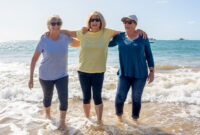Cheap travel for seniors doesn’t mean sacrificing comfort or enjoyment. This guide explores how older adults can experience fulfilling trips without breaking the bank. We’ll delve into affordable transportation options, budget-friendly accommodations, and inexpensive activities, ensuring a memorable and cost-effective travel experience. Planning ahead and utilizing resources designed for seniors can unlock significant savings, allowing you to explore new destinations and create lasting memories without financial strain.
Budget-Friendly Accommodation Choices
Securing comfortable yet affordable lodging is crucial for seniors planning budget-friendly travel. A range of options exists, each with its own set of advantages and disadvantages, allowing travelers to tailor their choice to their specific needs and preferences. Careful consideration of factors like location, amenities, and accessibility is vital in making the right decision.
Finding affordable accommodation doesn’t mean sacrificing comfort or safety. Many excellent options cater specifically to the needs and budgets of senior travelers, ensuring a relaxing and enjoyable trip.
Affordable Lodging Options for Seniors
Several lodging types offer budget-friendly options for senior travelers. These include hostels, guesthouses, vacation rentals, and senior-specific housing. Each option presents a unique balance of cost, amenities, and convenience.
- Hostels: While often associated with younger backpackers, many hostels now offer private rooms suitable for seniors, providing a social atmosphere at a lower cost. However, amenities might be more basic than in hotels.
- Guesthouses: These offer a more personalized experience than larger hotels, often with charming local character and a focus on hospitality. They may lack extensive amenities but frequently offer a comfortable and affordable stay.
- Vacation Rentals: Platforms like Airbnb offer a wide variety of apartments, condos, and houses for rent, providing more space and kitchen facilities than hotels. However, amenities and accessibility vary widely, and thorough research is essential.
- Senior-Specific Housing: Retirement communities or assisted living facilities sometimes offer short-term stays, providing tailored services and support for seniors. This option is typically more expensive than others but offers greater peace of mind and accessibility.
Pros and Cons of Different Accommodation Types
The best accommodation choice depends heavily on individual needs and priorities. The following outlines the advantages and disadvantages of each type:
- Hostels:
- Pros: Generally the cheapest option; social atmosphere; often centrally located.
- Cons: Basic amenities; may be noisy; shared facilities.
- Guesthouses:
- Pros: Personalized service; often charming and locally owned; quiet and comfortable.
- Cons: Limited amenities; may lack accessibility features; potentially less centrally located.
- Vacation Rentals:
- Pros: More space and privacy; kitchen facilities; often family-friendly.
- Cons: Can be more expensive than hostels or guesthouses; amenities vary greatly; accessibility needs to be verified.
- Senior-Specific Housing:
- Pros: Tailored services; accessibility features; supportive environment.
- Cons: Most expensive option; may require advance booking; less flexibility.
Average Cost Comparison of Lodging Types
The following table presents estimated average nightly costs for different lodging types in three popular senior travel destinations. These are estimates and can vary significantly based on season, location within the destination, and specific amenities.
| Lodging Type | Average Cost/Night (London) | Average Cost/Night (Paris) | Average Cost/Night (Rome) |
|---|---|---|---|
| Hostel (Private Room) | $50-$80 | $60-$90 | $40-$70 |
| Guesthouse | $70-$120 | $80-$150 | $60-$100 |
| Vacation Rental (Apartment) | $100-$200 | $120-$250 | $80-$180 |
| Senior-Specific Housing (Short Stay) | $150-$300+ | $180-$350+ | $120-$250+ |
Health and Safety Considerations for Budget Travel
Budget travel doesn’t mean compromising on safety and well-being, especially for seniors. Careful planning and proactive measures can ensure a healthy and enjoyable trip without breaking the bank. This section details essential health and safety precautions to consider when planning a budget-friendly adventure.
Prioritizing health and safety is paramount for seniors embarking on budget travel. This involves meticulous preparation in several key areas, from securing appropriate insurance to packing essential medical supplies and establishing reliable emergency contacts. Careful consideration of accessibility in accommodation and transportation choices is also crucial for ensuring a comfortable and safe journey.
Travel Insurance and Medical Preparedness
Comprehensive travel insurance is a non-negotiable aspect of any senior’s travel plans, particularly when budgeting. It provides crucial financial protection against unexpected medical emergencies, trip cancellations, and lost luggage. Policies should cover medical evacuation, hospitalization, and repatriation costs. Before departure, seniors should consult their physician to obtain a complete list of necessary medications, including prescriptions and over-the-counter remedies. Sufficient quantities should be packed, with copies of prescriptions readily available. Furthermore, it is advisable to carry a detailed medical history, including allergies and pre-existing conditions, along with emergency contact information for both family and medical professionals. Consider carrying a small, easily accessible medical kit containing bandages, antiseptic wipes, pain relievers, and any other personal medications.
Accessible Accommodation and Transportation
Choosing accessible accommodations and transportation options is crucial for seniors with mobility limitations. When booking hotels or other lodgings, explicitly specify accessibility requirements, such as wheelchair ramps, grab bars in bathrooms, and wider doorways. Research transportation options beforehand; consider using accessible taxis or ride-sharing services that provide vehicles equipped with ramps or lifts. Public transportation should be researched thoroughly for accessibility features. For longer distances, consider train travel, which often offers more accessible options than buses or airplanes. Remember to book accessible seating in advance when flying.
Essential Packing List for Safe and Healthy Travel
Proper packing is essential for a smooth and safe trip. The following items should be prioritized:
- Medications: A sufficient supply of all prescribed and over-the-counter medications, with copies of prescriptions.
- First-aid kit: Bandages, antiseptic wipes, pain relievers, anti-diarrheal medication, motion sickness remedies.
- Emergency contact information: A list of emergency contacts, including family, doctors, and local emergency services, readily accessible and ideally in multiple locations.
- Photocopies of important documents: Passport, driver’s license, insurance information, medical history, and flight/hotel confirmations.
- Comfortable walking shoes: Supportive footwear is crucial for preventing injuries, especially during long days of sightseeing.
- Appropriate clothing: Layers are recommended to adjust to varying temperatures. Pack lightweight, breathable fabrics.
- Portable charger: Staying connected is important, and a portable charger ensures your phone remains functional.
- Small flashlight: Useful for navigating dark areas or power outages.
Concluding Remarks
Ultimately, cheap travel for seniors is achievable with careful planning and resourcefulness. By leveraging discounts, choosing affordable transportation and lodging, and selecting free or low-cost activities, seniors can enjoy enriching travel experiences without compromising their financial well-being. Remember to prioritize health and safety, and enjoy the journey!




